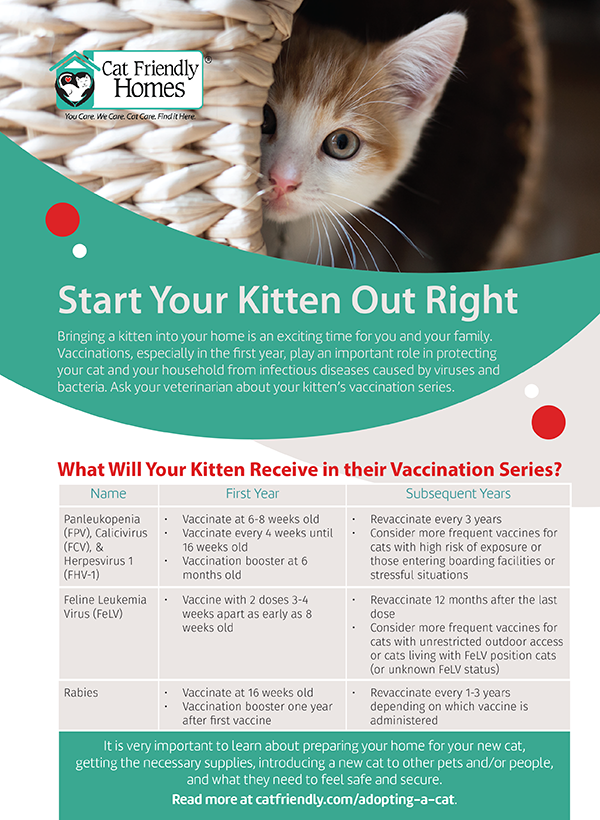One of the best ways to keep your cat healthy is by ensuring they receive all of the recommended vaccinations. You should speak with your veterinarian to learn which vaccinations are recommended for your cat.
The following information can help you understand the importance of vaccination and the role it plays in protecting your cat and your household. View our full brochure on Vaccinations for Your Cat for more information.
Why Does My Cat Need to be Vaccinated?
Vaccines help protect against specific infectious diseases caused by viruses and bacteria. The use of vaccines has prevented death and disease in millions of cats and it is important to continue this practice to ensure cats are protected throughout their lives. Vaccines also protect people from diseases, such as rabies, that could be transmitted from cats to humans.
Even cats living totally indoors require regular vaccination as they may be exposed to diseases in many circumstances (such as travel or boarding, interaction with other cats, the addition of a new cat to the home, and even viruses carried on your clothing).
Your veterinarian is the best person to evaluate your cat’s individual needs in order to discuss which vaccines are necessary and how often they should be given to provide the best protection for your cat. The vaccines your cat needs will depend on his health status, age, lifestyle, and what diseases are common in your area.
Why Does My Kitten Need a Series of More Than One Vaccine?
During the first few times kittens nurse, they receive antibodies from their mother’s milk that will help protect them against infectious diseases. The antibody levels decline before the kitten has developed their own immunity which may leave them susceptible to disease. The rate of decline is different for every kitten, so a series of vaccinations is given to help protect as many kittens as possible that may become susceptible to disease during this vulnerable time.
How Often Does My Cat Need to Be Re-Vaccinated?
Your veterinarian will be able to customize a vaccination schedule for your individual cat that includes such factors as:
- Health status
- Your cat’s age and lifestyle
- How likely your cat is to be exposed to a specific disease
- Licensing regulations in the area where you live or travel
This is why re-vaccination intervals may vary, both cat to cat, home to home, and with different diseases. Your veterinarian will be able to customize a vaccination schedule for your cat.
What are the Risks of Vaccination?
Following vaccination, your cat may experience mild and short-lived reactions (malaise), such as poor appetite, lethargy, and fever that resolve without treatment. Rarely, more serious allergic reactions occur and may include vomiting, diarrhea, facial swelling, difficulty breathing, or an injection site sarcoma.
Your veterinarian is the best person to evaluate your cat’s individual needs in order to discuss which vaccines are necessary and how often they should be given to provide the best protection for your cat.



